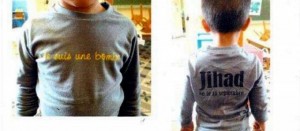 Is it a provocation or an incitement to terrorism to name your son “Jihad”? How about if you send your son, Jihad, to school wearing a t-shirt stating “Je suis une bombe” (I am a bomb)? This actual case is being tried currently in France, with a judgment expected next month. The boy in question was born Sept 11, 2009 and was given the name Jihad by his parents. Last fall his uncle gave him a t-shirt with the bomb quote on the front and on the back, “Jihad, né le 11 septembre” (Jihad, born September 11th), which he wore one day to nursery school. Bouchra Bagour, the mother, was reported to police by the teacher and charged with “glorifying crime”. She and the uncle now face a maximum sentence of up to five years in prison and a 45,000 Euros fine. They say the shirt was supposed to be a joke and highlight the boy’s birthday.
Is it a provocation or an incitement to terrorism to name your son “Jihad”? How about if you send your son, Jihad, to school wearing a t-shirt stating “Je suis une bombe” (I am a bomb)? This actual case is being tried currently in France, with a judgment expected next month. The boy in question was born Sept 11, 2009 and was given the name Jihad by his parents. Last fall his uncle gave him a t-shirt with the bomb quote on the front and on the back, “Jihad, né le 11 septembre” (Jihad, born September 11th), which he wore one day to nursery school. Bouchra Bagour, the mother, was reported to police by the teacher and charged with “glorifying crime”. She and the uncle now face a maximum sentence of up to five years in prison and a 45,000 Euros fine. They say the shirt was supposed to be a joke and highlight the boy’s birthday.
In fact, the actual meaning of “Je suis une bombe” is something like I’m fantastic (like English ‘da bomb’). Jihad is a first name that has been used for a long time. The case has created much discussion in France. Here’s one comment from a reader forum for the French daily Le Parisien:
“Je m appelle Jihad , j’ai fait des études et je n’ai aucun problème dans ma vie. Jihad n’est pas un prénom né le 11 septembre , vous êtes au courant ? Il est donné depuis des millénaires. Le mot jihad à la base veut dire lutte contre ses péchés.” (My name is Jihad, I’m a university graduate and have never had any problems [with my name]. Jihad is not a name created by September 11th, did you know that? It’s been used for millennia. The word jihad means to fight to overcome one’s sins.).
It’s not just in France that the word Jihad arouses controversy. Last fall conservative blogger Pamela Gellar’s American Freedom Defense Initiative ran a series of ads on buses which stated, “”In any war between the civilized man and the savage, support the civilized man…Support Israel, Defeat Jihad.” In response, the the Council on American-Islamic Relations has begun a campaign to educate Americans both about the traditional meaning of jihad and the real nature of Muslims. The “My Jihad” campaign is running ads on public buses, featuring Muslim Americans talked about the struggles they have confronted (i.e., their “jihads”).
